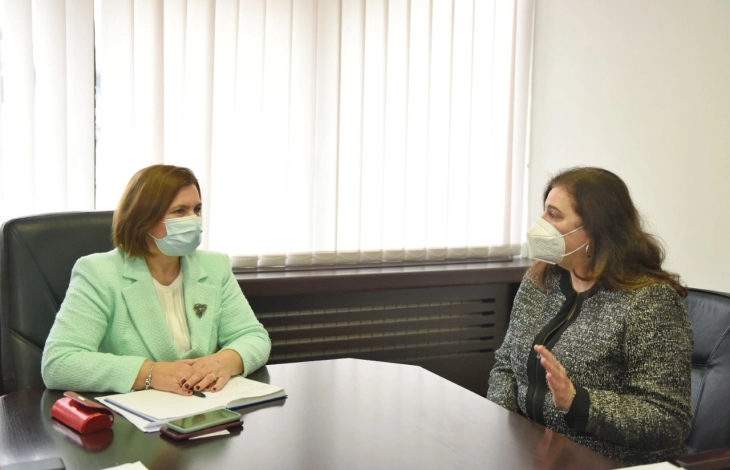Shahpaska-Tawilah: Good harmonization of health and social protection to ensure equal access to services

Skopje, 16 November 2021 (MIA) – Minister of Labor and Social Policy Jagoda Shahpaska met on Tuesday with WHO Representative to North Macedonia Jihane Tawilah and discussed managing socio-economic inequality in providing health services, with special focus on inter-institutional cooperation and exchange of information, as crucial aspects in creating measures for vulnerable categories of citizens.
Chris Brown, Head of WHO’s European Office in Venice, also attended the meeting.
Minister Shahpaska, the Ministry of Labor and Social Policy said in a press release, underlined at the meeting that at the onset of the pandemic the government set two crucial priorities – job retention and assistance and support for vulnerable categories of citizens. Six sets of economic measures were created to respond to the needs of citizens and companies, who were most affected by the pandemic. Moreover, access to social protection was facilitated in order to help citizens overcome the crisis more easily.
“The success of social reform doesn’t lie in recruiting more citizens into the social protection system, but activating the labor market through individual plans drafted by the Employment Agency and social work centers. The Operative Plan of Active Measures and Programs has been a success as proven by the realization rates for 2020 and 2021, which stand at 94% and 87% respectively,” Shahpaska said.
She underlined that the Ministry of Labor and Social Policy is focused on working with vulnerable categories of citizens and providing them with assistance and support that fit their needs. In that regard, the Ministry is trying to improve the availability of social services at local level, build kindergartens in rural areas, find work for the “hard-to-employ”, support the elderly, promote the rights of people with disabilities, ensure gender equality, formalize informal jobs, etc.
WHO Representative to North Macedonia Jihane Tawilah expressed satisfaction over her talk with Minister Shahpaska, during which they stressed the importance of the social agenda and social reform in health, as well as equal access to health services for the whole population.
“Monitoring health equality is crucial for having good, evidence-based policies, and should be part of the national development strategy. The WHO and national partners will support the establishment of a national framework for monitoring health equality,” said Tawilah.
Interlocutors, the press release read, underlined at the meeting that good harmonization of health and social protection will ensure equal access to services.







